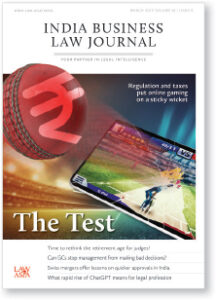Government eyes tax potential of skill-based online games
The past few years has seen the emergence of fantasy sports and skill-based online games, which have taken a hold in India. Driven by a confluence of factors, their emergence has been due to easy access to mobile devices, rapidly spreading internet access, as well as the pandemic and its subsequent government-imposed lockdowns.
One of the largest players in the space – Dream 11 – has a valuation of USD8 billion, and raised USD840 million from prominent global investment companies such as Tiger Global in FY2022. Globally, the fantasy sports market was valued at USD24 billion in 2021, and expected to grow to USD78 billion by the end of this decade.

India Business Law Journal
However, these games have received a frosty reception from state governments and some courts. States including Odisha, Andhra Pradesh, Telangana, Assam and Sikkim have banned online gambling games along with Dream 11. Battles are also playing out in court, with state governments and concerned citizens pitted against online gaming companies. Kerala’s Chief Minister, Pinarayi Vijayan, last year cited instances of people losing their savings and resorting to loans to recover lost money as a reason to ban online rummy.
But on the national level the federal government, seeing the revenue potential of the sector, is choosing the route of taxation. Our Cover story weighs in on the legal ramifications and immediate repercussions of recent amendments to the 2021 Information Technology Rules, and more recent drastic changes in the tax regime.
The proposal to levy a 30% income tax on net winnings from online games was made a part of the Finance Bill, which followed the Budget presentation by Finance Minister Nirmala Sitharaman.
The proposed new rules under the Income Tax Act will come into effect from 1 April 2024. Similarly, the GST Council is deliberating whether to increase the goods and service tax imposed on online skill-based games to 28%, as opposed to the current 18%, which has the industry even more worried. What remains to be seen is whether India will be able to sustain the earlier industry growth figures, or whether the new rules will lead to an unprecedented decline and exit of players from the online gaming industry.
In this month’s Spotlight, Andrew Godwin weighs the pros and cons for a mandated retirement age for judges. For arguments that support mandating a retirement age, reasons such as a declining mental capacity, older judges being out of touch with the contemporary value system, paving the way for younger judges, etc., are cited, with the caveat that these reasons may not apply to all judges.
The article looks at the situation in India and around the region, with jurisdictions like Hong Kong having successfully increased the retirement age for judges for various reasons, from numerous pending cases to enabling the retention of experienced senior judges and attracting experienced and quality private practitioners to join the bench. Godwin, a regular columnist with our sister journal, China Business Law Journal, asks the question: Is the retention of such an enormous wealth of legal experience not worth considering?
In this month’s Vantage point the legal team of Innoterra India, who were part of a recent Swiss merger that was successfully completed in a record seven days, highlights the shortcomings of Indian M&A, where even the fast-track method takes seven to eight months to complete.
The article recommends the Swiss method, citing that there are 21,000 cases before the National Company Law Tribunal (NCLT), of which 60% are insolvency cases. This increased pressure on NCLT infrastructure lengthens the wait for other processes like M&A.
In our Intelligence report, Shalini Saxena, head of legal at crypto firm CoinDCX writes about the new rage – ChatGPT. With the increasing interference of AI and AI-enabled technology, the critical question arises: Will ChatGPT replace lawyers altogether or simply play a supportive role? Saxena underscores the reasons that this new buzz is prone to failure and may not be able to handle the complexities of a legal case as accurately as its human counterparts.
Outside of this there is the cost factor, the bias, constant upgrading, customisation and other factors. Given that there is no single source of truth for AI, Saxena posits ChatGPT as a “useful AI helpmate” but not a useful replacement for lawyers.
In Dealing with bad decisions, we look at the role and responsibility of in-house counsel when they are faced with poor management decision-making. The article highlights how general counsel are now vested with developing crisis management strategies and protecting the company’s reputation. The GC’s role in certain situations may expand from a gatekeeper to a conscience keeper or whistleblower. Through insights from partners and GCs, the article also reflects on how the GC can deal with resistance from within the organisation and the conflicting interests of different stakeholders.


























